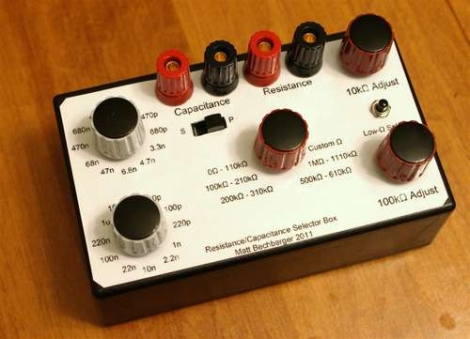
While working on electronics projects, it’s often necessary to test out different capacitance or resistance values as things are moving along. Depending on what you are testing, this can be a tedious process even when using a breadboard. Instructables user [mattthegamer463] recently built a very useful device that would help out in these situations, and would likely be a welcome addition to any Hackaday reader’s workbench.
His variable resistor/capacitor box makes it easy to test out any number of different resistance or capacitance values with a simple turn of a knob. He wired up a pair of pots to provide a wide range of resistance values, being sure to add a low-resistance safety as well as safety override switch for those of you who like to have things blow up in your face live dangerously. A set of 22 capacitors were wired up on a piece of perfboard, each of which can be selected using a pair of knobs. He added a simple switch to allow the capacitors to be toggled between parallel and series orientations as well.
[Matt] did a wonderful job here – this is a great project that can be customized in a multitude of ways to fit almost anyone’s specific needs.















this is thee type of thing i need but dont think i would buy the parts for and make… dont know why exactly. I would probably buy a kit for something like this though…
Nice build, but I’m a bit puzzled by HAD’s description that makes this sound like original/unique device. Or it could just be me.
College labs have more resistor / cap boxes exactly like this then they have engineering students. I think at one point in my late college career we were using them as doorstops and paper weights.
@bill
What is a “paper weight”? ;)
Has he measured the capacitance at the end of his two test probes to see if with the capacitance of the cables, the perfboard, the switch etc. the total capacitance bears any resemblance to the value he’s dialed in?
It’s like the resistance boxes. At uni I found I got far better measurements by going and fetching a real resistor than by using the old damp boxes full of rusty wire.
@Bill
I read the article several times trying to see where HAD said it was original or unique. I cannot seem to find it. Useful: Yes. Unique/original: No
Plenty of trolls in the comments though.
Good old “decade box”. I just recently found one at a electronics swap meet for $5. Precision unit also (1% resistors).
In reference to Al comments, these weren’t to be used for fine tuning circuits, but just to get you “in the ballpark”.
Especially useful when rebuilding older circuits with little to no documentation, like the early days of car digital dashes.
But I guess if it doesn’t use a microprocessor…..
I wish someone would make a test box like this(and write it up) for identifying faulty wiring in trailer tailboards because nearly every car i’ve had has suffered serious electrical damage as a result
(SLAP FOREHEAD) “Why didn’t i think of this?”
No low range of Ohms. Dual pots are nice to work with in pairs or balanced. This includes the ability to display resistance while tweaking in the powered circuit.
I made a substitution box for 6db crossover design, caps and inductors. Tweak and listen, results instantly.
@Bill; Not everyone is older than dirt ;) Maybe if another come across soothing or concept they hadn’t see before their description of it may come across as it is something new. Decade substitution boxes came to mind here as well. I’m on my netbook with limited SSD space, and I don’t have open office installed to open the files to study the build well. However from what do see Matt didn’t set out to build familiar decade substitution boxes. He appears to be ignorant of their existence, and hid build is an dependent thought process to fill a need of his. That is not a criticism, but a shout out to a true hacker
@D_
I’m only 25!! Decade boxes are still very relevant in proper engineering education.
Hence, my surprise at HAD for not saying something to the effect of “He built a box similar to what every engineering student encounters at school”.
Like I said it was a nice build, and I’m not criticizing the hacker. Just poking HAD in the side a little for their lack of knowledge on the common device. To me, it’s like saying someones DIY bench power supply would be a “welcome addition to any Hackaday reader’s workbench.”
HAD personal should be the subject matter experts, right? Or maybe I just have the wrong impression of HAD. (Er, that could read with a negative tone. I don’t mean it too.)